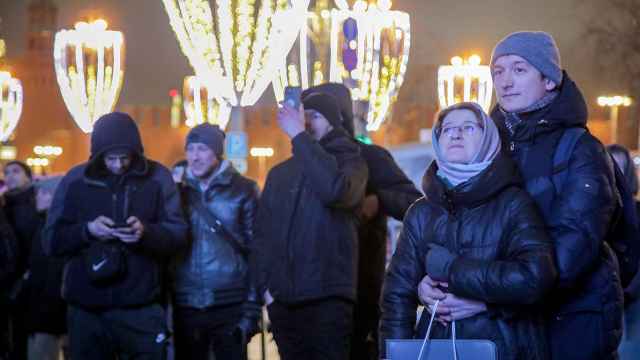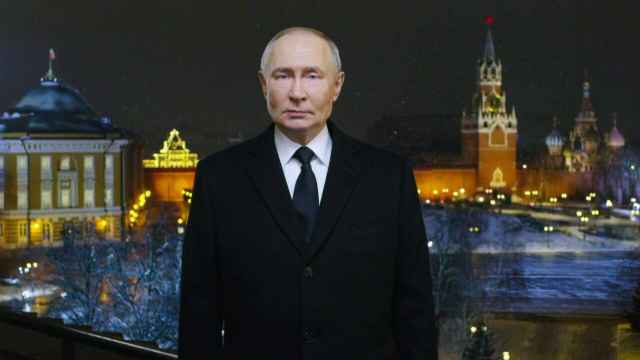German prosecutors have offered assurances that there was no conflict of interest for Russian investigators helping them with a bribery case involving U.S. computer giant Hewlett-Packard and the Prosecutor General's Office in Moscow.
"We took extreme precautions and thought carefully about whom to contact [in Moscow]," Wolfgang Klein, a spokesman for prosecutors in Dresden, told The Moscow Times on Friday.
German investigators suspect that individuals linked to HP paid 8 million euros ($10.8 million) to win a 35 million euro ($47.2 million) deal to equip prosecutors throughout Russia with hardware and software enabling secure communications.
A German request for help led to a raid at HP's Moscow office on Wednesday. The search, carried out by agents from the Investigative Committee, resulted in the confiscation of documents that should be sent to Dresden, Klein said.
He said German prosecutors did not know who received the bribe money and had no evidence so far that officials from the Prosecutor General's Office, including those assisting the German investigation, might have taken it.
Klein stressed that his office did not believe that Russian investigators were involved. "Nothing points in that direction," he said by telephone from Dresden.
He noted that procurement for the Prosecutor General's Office, like for most government agencies, is handled by a separate department.
A woman who answered the phone at the prosecutor general's press office Friday said questions would only be accepted in writing and that no answer would be sent before Monday.
Natalya Vishnyakova, who served as the prosecutor general's chief spokeswoman from 2002 to 2006 — which, according to Klein, matches the period when the kickbacks were paid — said in an interview published Saturday that any suspicion that her former colleagues had accepted money were baseless.
She said the equipment deal was carried out as a tripartite agreement between the prosecutor's office, HP and an unidentified bank. "This was a three-sided agreement involving one of the big Russian banks. The Prosecutor General's Office was just a recipient of goods in this case," she told Kommersant.
Vishnyakova, who now works as an adviser to former Prosecutor General Vladimir Ustinov, the presidential envoy to the Southern Federal District, also said HP got the deal because it made the best offer. "[HP] offered a comprehensive solution, while others just offered the hardware," she said.
The Prosecutor General's Office is a key government agency in President Dmitry Medvedev's drive to root out corruption. Both Prosecutor General Yury Chaika and his influential colleague, Investigative Committee head Alexander Bastrykin, are members of a presidential council against corruption.
The HP case also is delicate because of a fierce rivalry between Bastrykin and Chaika and their respective offices. The Investigative Committee is a semi-autonomous agency nominally subordinate to the prosecutor general. Since its inception in 2007, both agencies have sparred publicly, and their leaders are seen as belonging to two competing clans that vie for dominance over the country's law enforcement agencies.
It was unclear why Wednesday's raid at HP Moscow was carried out by the Investigative Committee and not by prosecutors.
Diplomats say requests for legal assistance must be sent via both countries' foreign ministries, implying that the decision on which law enforcement agency to use was made in Moscow.
But Marina Gridnyeva, a spokeswoman for the prosecutor general, has suggested that the Russians had no choice, saying the German search request was sent to the Investigative Committee "in accordance with the Criminal Procedural Code," Interfax reported.
The Investigative Committee has not commented on the case since announcing the raid Wednesday.
Nine people — including three Russians living in Moscow, according Klein — are suspected of setting up a complex web of bogus companies and accounts in a host of countries ranging from Belize to Lithuania to facilitate kickbacks.
The investigation, however, is focusing on one current and two former HP executives who live outside Russia, Klein said. The three were temporarily detained last December.
Among them is Hilmar Lorenz, a onetime HP executive in Russia. German authorities are looking into whether Lorenz conceived a plan to divert bribes through shell companies, The Wall Street Journal reported Friday, citing German court documents.
Lorenz, who now runs a software firm near Berlin, was head of HP's representative office in Moscow from 2001 until 2003.
The two other main suspects are Kenneth Willett and Paeivi Tiippana, the Journal said.
Willett, an American, is a former head of International Sales Europe, an HP subsidiary disbanded in 2007, while Tiippana, a Finnish citizen, preceded Willett as head of the subsidiary, the report said.
German investigators are involved because the head of ProSoft Krippner, a small software firm based in Delitzsch, is suspected of acting as a middleman in funneling some of the illegal money, the report said.
It is unclear whether the case has anything to do with a leadership change at HP's Russia office last fall. Owen Kemp, who had been the company's managing director for Russia since 2004, was replaced by Alexander Mikoyan on Nov. 1.
HP spokespeople refused to comment on any link between Kemp's departure and the investigation.
Klein said that Kemp was not among the suspects. "This name is not in my records," he said.
Former HP chief executive Carly Fiorina said over the weekend that she had no knowledge of the case during her tenure at the company from 2000 to 2005. Fiorina is currently seeking the Republican nomination for a U.S. Senate seat in California.
Meanwhile, the U.S. Justice Department and Securities and Exchange Commission have opened an investigation into whether HP violated the Foreign Corrupt Practices Act, the Journal reported, citing people familiar with the matter. U.S. companies are forbidden by law from bribing foreign government officials.
A Message from The Moscow Times:
Dear readers,
We are facing unprecedented challenges. Russia's Prosecutor General's Office has designated The Moscow Times as an "undesirable" organization, criminalizing our work and putting our staff at risk of prosecution. This follows our earlier unjust labeling as a "foreign agent."
These actions are direct attempts to silence independent journalism in Russia. The authorities claim our work "discredits the decisions of the Russian leadership." We see things differently: we strive to provide accurate, unbiased reporting on Russia.
We, the journalists of The Moscow Times, refuse to be silenced. But to continue our work, we need your help.
Your support, no matter how small, makes a world of difference. If you can, please support us monthly starting from just $2. It's quick to set up, and every contribution makes a significant impact.
By supporting The Moscow Times, you're defending open, independent journalism in the face of repression. Thank you for standing with us.
Remind me later.






